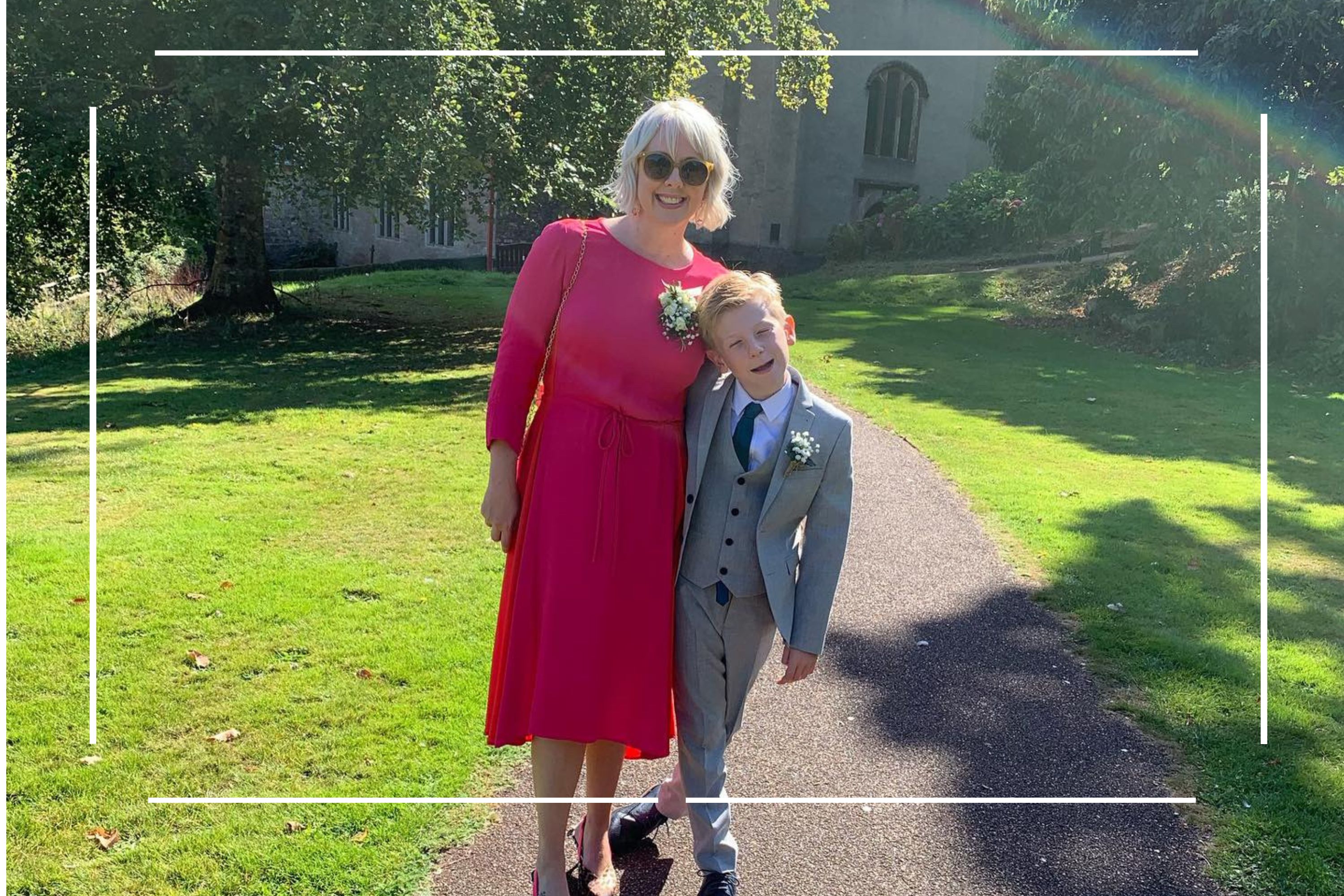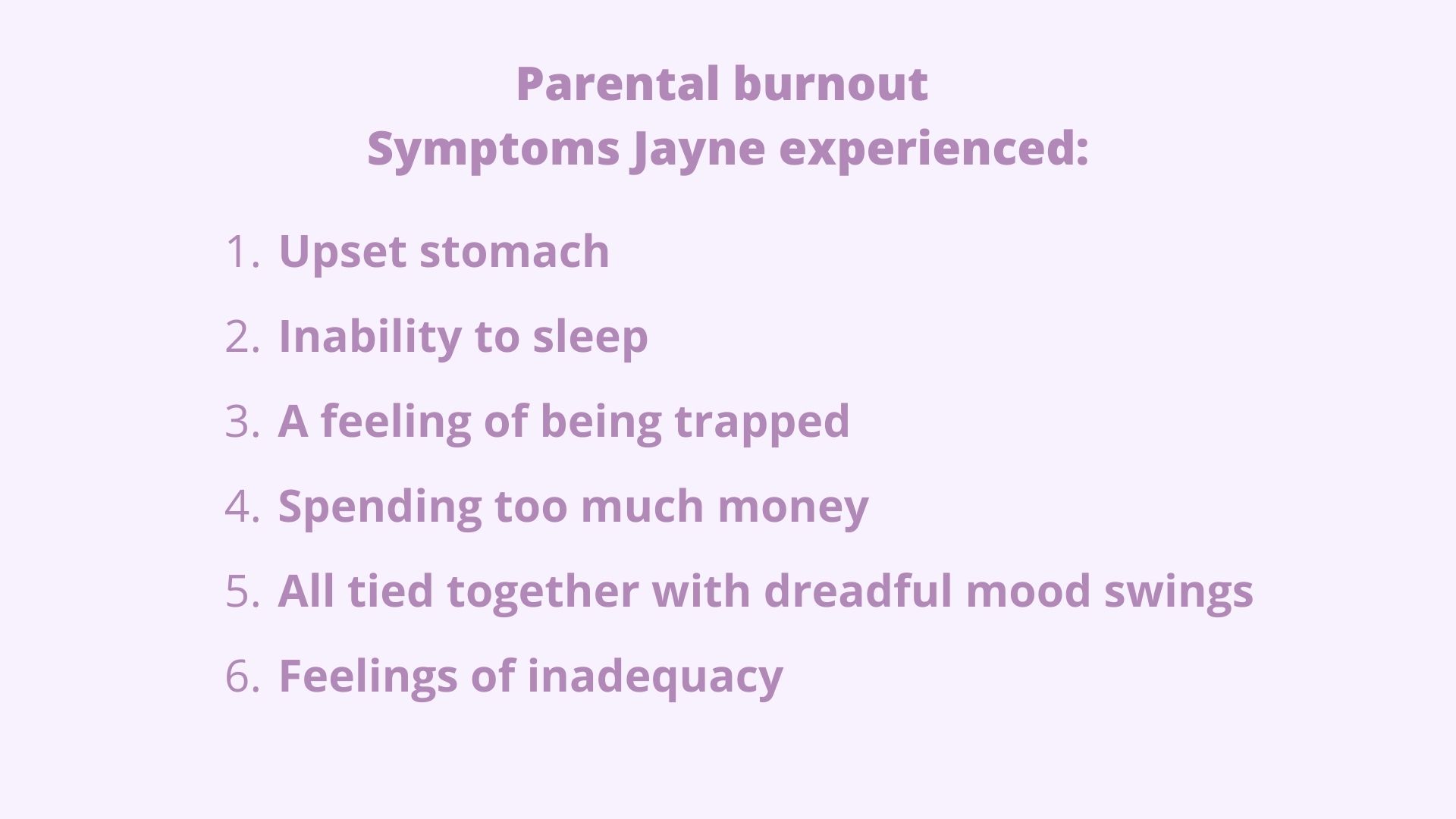Parental burnout nearly broke me and my family – know the signs
Parental burnout: one mum reveals her reality, and how she copes


Parental burnout is something that Jayne Cherrington-Cook, mum-of-one, knows all about. And these last two pandemic-filled years have really hit hard. Here, she shares her experience.
I was on the phone to my GP, when I first heard the phrase 'parental burnout', during a virtual consultation after suffering from sleep issues and a general low mood. I left the call with a prescription for anti-depressants and a whole new medical term to process.
"There was no big aha! moment, or breakdown. It was more a slow build up. A few people had commented ‘you don’t seem yourself’. I mean, I was functioning but barely. I didn’t feel I had any control over my body, it was like I was walking through mud. Being a parent of a Special Education Needs (SEN) kid I'm at the bottom of the pile, the dog even comes above me. So I never have the time or head space to stop and check in with myself. It wasn't until my GP started to ask questions that I focused on me and realised, I'm not okay.
Parental burnout: what is it?
Parental Burnout is a 'state of vital exhaustion', as described by The World Health Organisation. Which apparently leaves sufferers physically and mentally overwhelmed. And since the pandemic began, it’s created a pandemic of its own, with many parents suffering from various levels of burnout.
It was first recognised in the ‘80s and was originally described as “suffering from chronic workplace stress” by The World Health Organisation.
At first, I was slightly shocked at the diagnosis. Surely, burnout only happens to high-flying career types. So why was it happening to me – a mum of one who works part-time?
I caught up with Michelle Elman, a five-board accredited life coach, broadcaster, author of The Joy of Being Selfish: Why you need boundaries and how to set them and she told me; "Parental burnout is common, but as a society we overlook it. The work and emotional toll it takes to be a parent is often seen as a lesser form of work than having a career."
Parenting advice, hot topics, best buys and family finance tips delivered straight to your inbox.
The self-acclaimed instagram Queen of boundaries adds; "As a result of this, parents are less likely to allow themselves rest periods and breaks from parenting for fear of being painted as a bad parent or selfish.
When a parent is burnt out, they are likely to get more irritable. They'll have less control over both their emotions and their reactions. And ultimately they will find themselves waking up utterly exhausted no matter how long they sleep."
While I know that COVID has brought on a whole lot of pressure for parents, such as juggling work and home-schooling, for me it was literally the straw that broke my very tired back.
My son Milo, who is 11, is also autistic. And as any parent of a neurodivergent child will tell you, it’s exhausting.
Like, I always have to plan and think ahead as to how his day might go. I have to factor how he might cope with sensory overload, such as a shopping centre being too noisy or what might trigger a meltdown.
For instance we went to the cinema, and I know the routine we have. We park the car. We walk into the cinema and we always go to the Ben & Jerrys counter. But this time it was closed. I had to navigate and calm a 15 minute meltdown.
Milo needs reassurances and ‘actuals', details of what WILL happen. Which obviously I can't ensure as so much is out of my control.
And it's that lack of control, the now knowing that is draining. I feel I am always holding my breath. Waiting for the next meltdown. Its like I have an anxious bubble in my stomach and I'm waiting for it to pop. We have more than Plan B, we go up Plan D sometimes.
The mental exhaustion of planning can suck the joy out of parenting. Though, saying that I do try to stay positive, as we can have days where everything is smooth. Low expectations helps me through days.
I am also constantly having to advocate for Milo, to be his voice. Whether that’s with the local council to get an Educational Health Care Plan approved, or the school to explain why he's struggling to attend or do homework. It’s a job in itself – and it’s tiring as hell. The constant worry has really taken a toll on my mental health.
Recent research from Action For Children shows that 82% of UK parents have at least one warning sign indicating burnout. And, you don’t have to be a parent of a Special Education Needs (SEN) kid to feel the stress. Even if, like me, you have a hands-on partner, the reality is that most of the emotional labour is still left to women.
I doubt my husband worries about my son’s upcoming French test. Or the fact he’s got a birthday party at the weekend, which needs an accompanying birthday present. Or even that he has enough clean school uniform for the week.
Add all this on top of my job and day to day worries, it's no surprise Parental Burnout is a thing.

Parental burnout - the signs
The main symptoms I noticed and was experiencing were;
- Upset stomach
- Inability to sleep
- A feeling of being trapped
- Spending too much money
- All tied together with dreadful mood swings
- Feelings of inadequacy
These are all common side effects of parental burnout. And if it not treated in time, my GP advised that it can lead to suicide and even violent behaviour towards children.
The day I called the GP was the day I had hit the metaphorical wall. I was wrung out. I could barely get out of bed. And I couldn’t string a sentence together, which as a writer, is not good.
How to overcome parental burnout
Invest time and effort in self-care and learn to set boundaries. While I’m not fully there yet, I have realised that the key to dealing with this is self-care. And, after speaking to Michelle I now get that it's about setting boundaries.
In Michelle's words: "When you set strong boundaries, you allow the people around you to have their boundaries too because they know you are looking after yourself and therefore they can focus on their own needs.
"As a parent, set boundaries. It's far from mean or selfish, it means your kids will have a role model of what healthy and strong boundaries look like. And therefore as they grow up, they will have the experience, ability and language to be able to set their own boundaries. By setting yours you are teaching them how to communicate their needs and speak up for themselves."
Michelle's best advice for boundary newbies - which I very much am - is that you don't have to set them perfectly to begin with; "Whenever you do something new, it is going to be messy and clumsy and that's OK. Be firm, compassionate and state your boundaries as facts.
"The less you say, the less your boundary is up for debate. State it as a decision you have already made, as opposed to a point up for discussion. For example, if your child wants you to come to play with them and you need five minutes to yourself then explain that. You are allowed to limit the amount of time you play with them as well.
It might sound like; "Mummy is drinking a coffee right now and that's going to take 5 minutes, and then I will come play with you for 10 minutes and then I am going to go to work".
Michelle goes on to explain that: "If your child comes in when you are on the loo for example, this is the perfect time to teach them about privacy boundaries and saying things like "When the door is closed, you have to knock before you come in. And that means when you close your door, I will knock too before coming in.
"Model to your children that boundaries are mutual will demonstrate that they are allowed to have boundaries too."
Boundary setting and self care are not easy to do. For instance I am only now - 12 years into parenting - learning to carve out time that is just for me. I physically schedule this in on oura calendar. It's nothing fancy I just go upstairs and read a book or watch a true crime show – but as I’ve been told many times, I cannot pour from my cup if it’s empty.
Other things that help are exercise - and I know everyone says it, but seriously - yoga was a game changer for me. Long walks with my dog have helped, and sleep. That last one is tricky as my son still doesn’t sleep well, but I do make sure that at least one night a week I get tucked up in bed for 9pm.
The other thing that is so important for me is to have fun as a family. Parental burnout can often make you feel removed from your family. I’ll be honest, at times I’ve been resentful towards my son and husband, so now we regularly schedule in some fun stuff – whether that’s a game of crazy golf or a family movie. It reminds me of why I love my family and how rewarding it can be.
Where to get help for parental burnout
Don’t let anyone tell you that parental burnout isn’t real. It’s also not something that you get when you’re a ‘bad’ parent. In fact, I’ve found most of us who suffer from it are empathetic individuals, who really feel for our kids and just want to do the best for them.
And if you find yourself struggling, talk to someone. A friend. An online group. Your kid’s teacher. Anyone you think will understand and help you, because as they say, it takes a village to raise a kid – and there’s no shame in asking for that little bit of help from that village.
If you think you may be suffering from parental burnout look for further support. Contact your GP to make an appointment like Jayne did. Or find a therapist on the British Association for Counselling and Psychotherapy's online directory of registered members. Talking out loud about your your worries always helps.

With over 24 years’ experience in journalism, she’s written about a variety of subjects and is just as at home interviewing A-list stars as she is testing nappies. Having started her career writing about Pokémon, ponies and wrestling, Jayne moved into the world of film journalism, where she spent the next eight years pinching herself while she got paid to interview Hollywood film stars and attend premieres. Since then, she’s launched websites for major magazines, worked with top brands such as Westfield, LK Bennett and Hunter, and had her own tech column in Women’s Own.